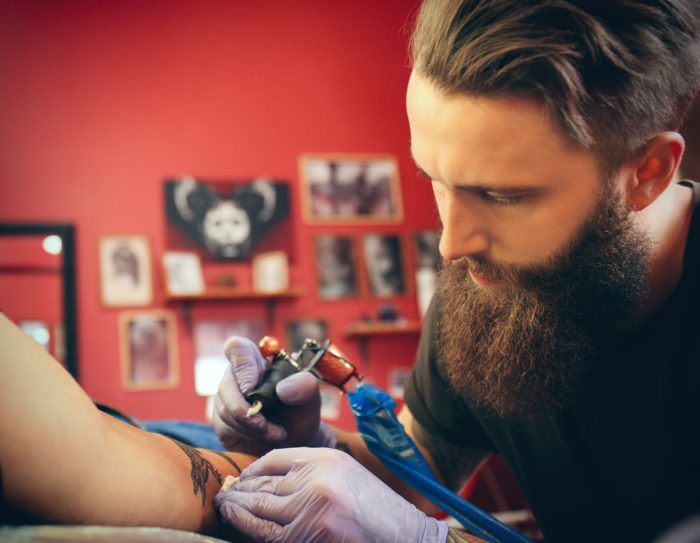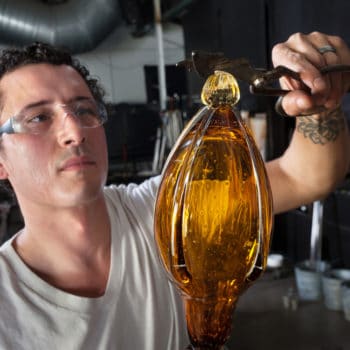Why We Love It
-
$62,130Potential Avg. Salary
-
0.7%Job Growth Rate
-
Growing DemandJob Outlook
-
Creativity FocusedCareer Attribute
Tattoo artists use specialized tools to apply permanent designs to the skin using non-toxic ink. They may create tattoos of their own design or apply tattoos in designs requested by clients. Tattoo artists may work in tattoo shops or own their own businesses. Tool sanitation and safety is of critical importance.
Recommended Schools
What is a Tattoo Artist?
The following job responsibilities are common for individuals in tattoo artist roles:
- Apply permanent ink to client skin in requested designs and patterns
- Use a variety of tools and techniques to apply permanent designs
- Create designs for clients or apply designs selected or submitted by clients
- Ensure proper sanitizing and care of tools to prevent the spread of disease and infection
- Educate clients on appropriate care of tattoos
A Day in the Life
Tattoo artists are artists who apply their designs to skin rather than other surfaces or materials. They use a specialized, non-toxic ink that creates permanent designs on client skin. To apply tattoos, tattoo artists must use a variety of tools. Additionally, they must ensure proper sanitation and care for tools to prevent the spread of disease and infection. Improperly sanitized, reusable tools can cause severe health issues, so it’s critical that tattoo artists always follow standardized sanitation protocols.
Many tattoo artists spend time creating their own designs. These designs are inserted into portfolios for clients to review when considering a new tattoo. Clients can choose tattoo designs from the tattoo artist’s portfolio, can bring in their own design, or can request a custom design from the artist. Many tattoo artists are trained as artists—either self-taught or in school—and use their training and talents to create special designs that meet client specifications.
Another important role of the tattoo artist is educating clients on tattoos. First, they must ensure clients understand that tattoos are permanent. Second, they must teach clients how to care for their tattoos, particularly in the weeks after application where the risk of infection is more likely. Many tattoo artists also offer body piercing services and may be trained as piercers. These tattoo artists install tongue, ear, eyebrow, nose, and other piercings for clients and teach clients how to care for new piercings.
Typical Work Schedule
There really is no typical work schedule for tattoo artists. Some work first-shift hours, some work second-shift, and some may work third-shift. Jobs can be either full-time or part-time depending on the employer and tattoo artist’s preferences. Evening and weekend work is common as those tend to be the busiest times for tattoo shops.
Typical Employers
Many tattoo artists are self-employed and own their own shops, share ownership of a shop with one or more other tattoo artists, or rent a booth in an established tattoo shop. Others work for tattoo chains or shops owned by other tattoo artists or business people.
Recommended Schools
How To Become a Tattoo Artist
No formal higher education is required in order to work as a tattoo artist. Instead, most tattoo artists learn the trade through apprenticeships. Apprenticeships are usually one- or two-year paid study programs under an experienced tattoo artist where apprentices learn how to apply tattoos, how to use tools, and how to ensure proper care for and sanitation of tattoo application tools. In some states and localities, apprentices must obtain an apprentice license to assist tattoo artists in their shops.
Formal requirements for tattoo artists are determined by state or local governments. Some states enforce strict guidelines as to the qualifications a tattoo artist must have in order to apply tattoos on clients in the state. Other states leave the requirements decision up to local governments. Even in states with loose regulations, obtaining the proper licensure or certification can be beneficial for tattoo artists because it inspires confidence in their abilities and safety among potential clients.
Because tattoo artists are in artistic positions, many find that a certificate or degree with a focus on art to be beneficial. Some pursue bachelor of fine arts degrees where they learn to perfect their craft, focusing on drawing and related areas. Because tattoos are permanent, low-quality work can be detrimental to a tattoo artist’s career. With a thorough education in art, aspiring tattoo artists are better prepared to apply tattoos that meet client specifications perfectly and result in increased business.
Tattoo Artist Salary Data
We’ve provided you the following to learn more about this career. The salary and growth data on this page comes from recently published Bureau of Labor Statistics data while the recommendations and editorial content are based on our research.
National Anual Salary
Low Range
$38,920Average
$62,130High Range
$100,240National Hourly Wage
Low Range
$19/hrAverage
$30/hrHigh Range
$48/hrHow do Tattoo Artist salaries stack up to other jobs across the country? Based on the latest jobs data nationwide, Tattoo Artist's can make an average annual salary of $62,130, or $30 per hour. On the lower end, they can make $38,920 or $19 per hour, perhaps when just starting out or based on the state you live in.
Salary Rankings And Facts
#250 Nationally for All Careers
Above Average Salary Nationally
Highest Education Among Tattoo Artists
- 1.9% Doctorate
- 12% Masters
- 45% Bachelors
- 9% Associates
- 18.4% College
- 10.7% High School
- 3% Less than High School
Job Growth Projections and Forecast
2014 Total Jobs
13,4002024 Est. Jobs
13,500Job Growth Rate
0.7%Est. New Jobs
100How does Tattoo Artist job growth stack up to other jobs across the country? By 2024, there will be a change of 100 jobs for a total of 13,500 people employed in the career nationwide. This is a 0.7% change in growth over the next ten years, giving the career a growth rate nationwide of Above Average.
Growth Rankings And Facts
#583 Nationally for All Careers
Above Avg. Growth Nationally
What Companies Employ The Most Tattoo Artists
| Industry | Current Jobs | New Jobs Needed | % Increase |
|---|---|---|---|
| Self-employed workers | 5,400 | --- | --- |
| Federal government, excluding postal service | 3,400 | -300 | 0% |
| Personal care services | 1,700 | 100 | 0% |













